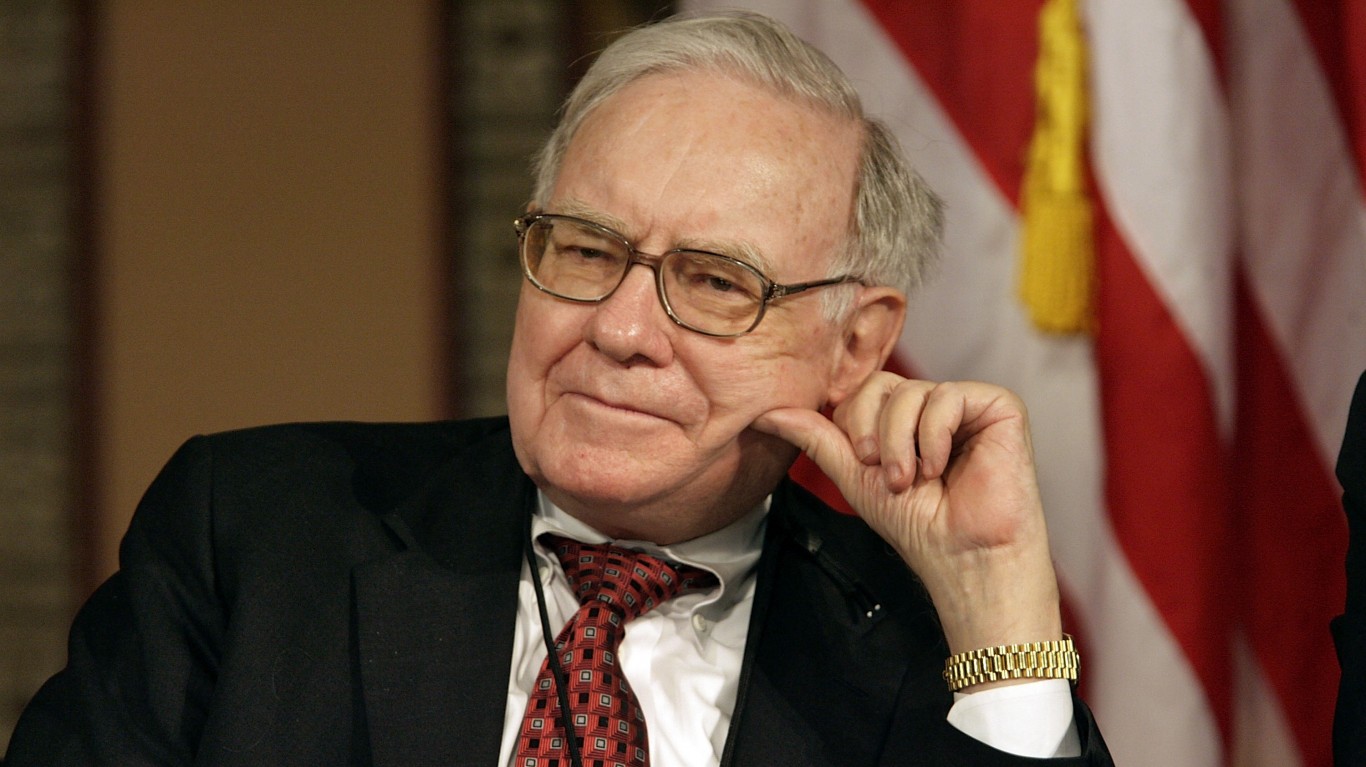Investing
As Berkshire Hathaway Keeps Buying Other Stocks, Financial Dominance Becomes More Obvious

Published:
Last Updated:

Warren Buffett may be getting older every year, but he and the giant Berkshire Hathaway Inc. (NYSE: BRK-A) have remained acquirers of public stocks for years. The conglomerate could even claim to be one of the largest mutual funds in America if it ever wanted to spin out its public investment portfolio. Don’t hold your breath for that to occur, particularly since Buffett has complained that the cost to acquire a company outright is just too high at the current valuations in the stock market.
What matters in 2019 is that Berkshire Hathaway is the largest conglomerate, with its $480 billion market capitalization. As of June 30, 2019, Berkshire Hathaway’s public equity holdings tallied $208.1 billion, a new record. And of that, Buffett and his portfolio managers now have almost $100 billion worth of shares owned in many of the top financial companies, and that doesn’t include their own GEICO and other insurance operations.
There have been many portfolio changes in Berkshire Hathaway’s public stock holdings over time. The Oracle of Omaha has not been able to make a “whale of an acquisition” for several years now, so he and his team have been using that $100 billion pile of cash to acquire more and more shares of public companies. 24/7 Wall St. has tracked almost all of his portfolio changes for well over a decade at this point.
Amazon.com Inc. (NASDAQ: AMZN) was a recently new stake for Berkshire Hathaway’s portfolio managers, but Buffett had praised the growth and explosive change brought on by Jeff Bezos in the past. The conglomerate raised its stake by more than 10% to end the second quarter with just over $1 billion at the close of June. Amazon’s stake is up to 537,300 shares from the previous holding of 483,300 shares.
Bank of America Corp. (NYSE: BAC) was another stake added to in the second quarter, although the investing community had formally known about this already. That stake is now 950 million shares, which is now above a 10% ownership stake as Merrill Lynch has been fully approved for its capital return plan from July 1, 2019, through June 30, 2020. Bank of America’s stake was raised to 927.25 million shares from 896.17 million.
U.S. Bancorp (NYSE: USB) was another bank in which Buffett added to its large stake. That stake was increased to 132.46 million shares from the previous holding of 129.31 million.
Red Hat Inc. (NYSE: RHT) was shown to be larger too, but it was pretty well known that this was a merger arbitrage bet more than was a return back into International Business Machines Corp. (NYSE: IBM) that Buffett had bailed out of several years earlier. Red Hat’s stake was raised to 5.17 million shares from 5.11 million.
Charter Communications Inc. (NASDAQ: CHTR) was a decreased stake, down to 5.43 million shares from 5.71 million.
USG Corp. (NYSE: USG) was no longer listed in the shares owned by Team Buffett, after years and years of ownership, but Knauf KG acquired the company in a $7 billion deal that took out Buffett’s 30% or so stake in the company.
Financial stock investments now have close to 20% of the entire market cap of Berkshire Hathaway. That’s up from about 12% just at the end of 2010, when the nation was still trying to recover from the Great Recession.
American Express Co. (NYSE: AXP) remained the same at 151.61 million shares.
Apple Inc. (NASDAQ: AAPL) was unchanged at 249.59 million shares.
JPMorgan Chase & Co. (NYSE: JPM) holdings were unchanged at 59.51 million.
Wells Fargo & Co. (NYSE: WFC) was another holding that remained unchanged with its shares totaling 409.80 million.
Kraft Heinz Co. (NASDAQ: KHC) has continued to be a thorn in the side of Buffett, and Berkshire Hathaway’s stake likely will be buried here for quite some time. The Kraft Heinz holdings remained unchanged at 325.63 million.
The average American spends $17,274 on debit cards a year, and it’s a HUGE mistake. First, debit cards don’t have the same fraud protections as credit cards. Once your money is gone, it’s gone. But more importantly you can actually get something back from this spending every time you swipe.
Issuers are handing out wild bonuses right now. With some you can earn up to 5% back on every purchase. That’s like getting a 5% discount on everything you buy!
Our top pick is kind of hard to imagine. Not only does it pay up to 5% back, it also includes a $200 cash back reward in the first six months, a 0% intro APR, and…. $0 annual fee. It’s quite literally free money for any one that uses a card regularly. Click here to learn more!
Flywheel Publishing has partnered with CardRatings to provide coverage of credit card products. Flywheel Publishing and CardRatings may receive a commission from card issuers.
Thank you for reading! Have some feedback for us?
Contact the 24/7 Wall St. editorial team.